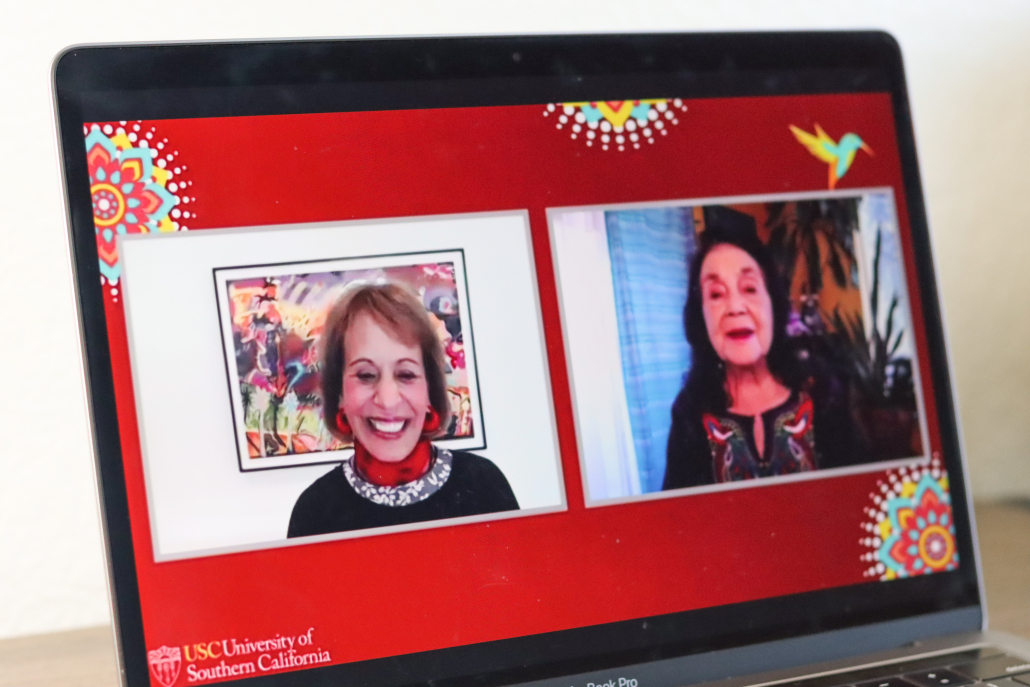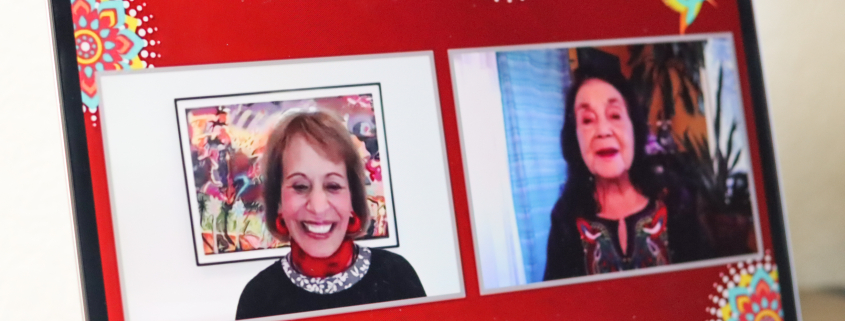No ‘white horse’: Huerta urges political activism to enact change

At the closing celebration for USC’s Latinx Heritage Month, President Carol Folt spoke with American labor leader and civil rights activist Dolores Huerta about her work with the farmworkers’ movement and the need for political activism. The event was hosted by La CASA, the Latinx Leadership Roundtable, USC University Relations and USC Cultural Relations and University Events. At the start of the ceremony, Huerta discussed the importance of engaging in community activism and participating in political events such as elections and the census. She also emphasized the impact that individuals can have on the political and social environment around them.
“A lot of people think that ‘Well, I really can’t make any difference, my vote doesn’t matter,’ but they don’t realize that if all of us put in a little bit of time … It gives all of us a great opportunity to become activists,” Huerta said. “Please get involved, even if it means just making a few phone calls asking people to register to vote.”
Huerta herself has participated and led numerous political movements. Along with fellow labor leader and activist Cesar Chavez, Huerta founded the United Farm Workers — the first enduring and largest union for farmworkers in the United States. Since its inception in 1962, UFW and Huerta have worked to improve wages and working conditions for farm laborers.
In her conversation with Folt, Huerta explained that the key to effective activism is bravery, which she witnessed during the farmworkers’ movement.
“We have to teach people, we have to make them understand that they have power and not to give up,” Huerta said. “You can imagine how difficult it was for farmworkers because there was so much fear that they would be fired and they wouldn’t have any work. So making them understand that they had that power gave them the courage to go on strike and go on marches and go all over the country to do boycotts and ask people to support them. Of course, we won because we had 17 million people in the United States that listened to the farmworkers.”
Huerta, who is now 90 years old, talked about how her upbringing inspired her to become the activist she is today. Her roots in political action started at a young age, she said, as her father was involved in politics in her home state of New Mexico.
“I believe that I was 8 years old when I found a bumper sticker and I put it on somebody’s car to vote for Franklin Delano Roosevelt,” Huerta said. “My father was an assemblyman in the state of New Mexico … So I was very fortunate in that respect, to know the importance of voting and the importance of being engaged.”
During the webinar, Folt discussed how many USC students are already participating in various activism efforts. Folt also acknowledged the farmworkers’ movement as an important aspect of history for students.
“I think you’d be really proud that our students have been pushing for many initiatives like this on campus,” Folt said in response to Huerta’s voter participation efforts. “I have got a renewed spirit for getting people to do the census, but it’s our students who are really the ones leading, and I think hearing from you is really important to them.”
Kamy Akhavan, executive director of the USC Dornsife Center for the Political Future, attended the event and shared his thoughts on Huerta, who he considered to be one of the most important feminists in American history.
“Dolores Huerta is a civil rights icon, and she has influenced millions and millions of people, so I expected to see the older version of a formerly very dynamic accomplished woman,” Akhavan said. “And what I got was a very accomplished dynamic woman who is 90 years old, and continues to inspire and be engaging and delightful, humorous and absolutely committed to the causes she holds dear.”
Huerta also shared her experiences working with farmworkers to create social change.
“I think the moment when the farmworkers came out on strike was a great moment because people are literally walking off of their jobs, and the strike went on for five years,” she said. “They stood out there for five years just picketing and doing the work that had to be done.”
Toward the end of the ceremony, Huerta spoke on the current politically charged climate in the United States. She also told the audience that they need to be the change they want to see in the world and that the most important thing to do right now is to care for one another.
“The main thing is that we have to learn that we are the only ones that can change this. We really can’t wait for somebody to come in on a white horse and do it for us, it’s up to us,” Huerta said. “I think the pandemic has shown us that we have to take care of each other. I just want to remind everybody that we are one human race.”
Isabel Gonzalez, a junior studying communication, found the ceremony with Huerta inspiring and resonated with Huerta’s comment about unity. She also said that she was amazed by Huerta’s eagerness to teach.
“She was so motivated and she had a lot of energy, and just the motivation to pass on information and share her knowledge at her age,” Gonzalez said. “I think that that’s really inspirational that even at her age, she’s still making an impact.”

